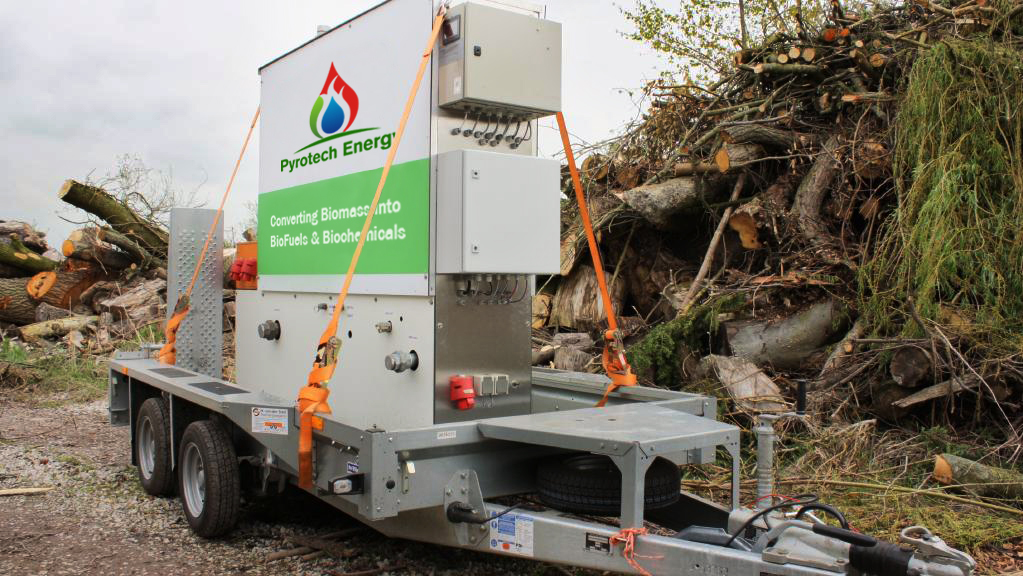Converting wood waste and agriculture residue into bio-energy and biochemical through a Mobile Pyrolysis Plant
Use of Bioenergy—energy produced from organic matter or Biomass—has the potential to increase energy security, promote economic development, and decrease global warming pollution.
After many years of development Biomass Pyrolysis has finally matured as a commercial technology. The goal is to use heat in the absence of oxygen to convert the Biomass to a more useful form while preserving as much of the carbon possible. The water and oxygen associated with the carbon is reduced. In commercial practise, pyrolysis is the simplest and lowest cost option for converting Wood Waste & Agriculture Residue into Biofuels and Bio-Chemicals.
Currently our rate of consuming fossil raw materials has exceeded the ecological carrying capacity of our planet and the only way reversing this trend is to implement technologies that will allow us to get the planet back onto a sustainable path. There is no other product that promotes this objective more effectively than Wood Waste. It generates much more renewable energy than is required to maintain, dispose, burn or leaving it to rot creating more CO2 emissions. This supports the general conception of ensuring modern energy sources, giving optimal substance to the ideas of a circular economy and the cycle of nature. Forest reserves and Agribusinesses that serve as carbon sinks and those that are sustainably managed are directly linked to combating climate change and to the goals of promoting sustainable consumption and production methods. The forestry industry is also an example of a sector that enables jobs, infrastructure, innovation in the bio-economy and waste to energy industry around the world and play a critical role of establishing cities and local communities built on a sustainable basis.
Responsible forestry is similarly in line with the objectives for life on our planet, and is a condition of future forest growth, protection and remediation of terrestrial ecosystems, promotion of their sustainable use, and an end to soil erosion and loss of biodiversity. We respond precisely to these requirements by processing renewable wood from responsible sources in a way that extracts everything from this raw material and converting it to Biofuels and Bio-Chemicals.
All sustainable activities are naturally based on the idea of not wasting resources, living beyond one’s means, or exceeding the carrying capacity of human beings or the environment. In this respect, making new Bio-products from industrial side streams and waste is something that Pyrotech Energy fosters and different from merely burning wood, which is a terrible outcome polluting the planet atmosphere with more CO2 emissions.
One example of the practical significance of emission reduction targets for various industries is that they will lead to increasing concern over the carbon footprint of products and the forms of energy that are used for manufacturing them. The forest industry by-products already emerge as clear winners under any such scrutiny, compared to industries that rely on fossil raw materials. A product that is made from a renewable raw material using renewable energy by a process that generates a surplus of renewable energy – and on top of that is also recyclable is bound to satisfy sustainability requirements completely.
Pyrotech Energy is a leading technology licensor and provider of equipment, engineering support and service to the waste to energy industries. Our company has commercialised the eco-fining process for the conversion of Wood Waste and Agriculture Residue into Biofuels and Bio-Chemicals. Our company wants to contribute to a more sustainable society by providing a renewable alternative to fossil fuels. This will be done through the delivery and deployment of Mobile Pyrolysis Plants Technology for converting Biomass to Bio-Crude Oil, Syn-Gas, Biochar and Wood Vinegar in an environmentally, socially and economically sustainable manner and is based on four principles.
- A mobile unit goes to the Biomass storage location.
- It locally converts Biomass into Bio-Crude Oil, Syn-Gas, Biochar and Wood Vinegar.
- The Syn-Gas is used locally to generate electricity.
- The Bio-Crude Oil and Bio-Chemicals are used locally or at another facility.
This concept is introduced recognising that central processing of Biomass is in the long term not viable with heavy up front capital cost and intensive ongoing funding. Because centralized processing always remain dependant on the owners of Biomass, Transportation Costs and Labour Costs. If these owners increase the price of their Biomass or services most certain central plants are no longer economical viable. Our concept is fundamentally different from the traditional were Biomass is transported to a central plant with two models the 2T-MPP and the 10T-MPP, where our biggest model converts every 10 tonnes of feedstock to 2500 litres of Bio-Crude Oil with HHV at 24 MJ/lt, 1 Tonne of Biochar, 2500 litres of Wood Vinegar on a daily basis and Syn-Gas Nett equal to 50 KW/h for every hour that the Unit operates, thanks to the plants unique patented reactor that is capable separating the biomass to fragmentations without any waste streams and with no catalytic converters.
Turning Waste Wood into Bio-Crude Oil and Bio-Chemicals gives the opportunity to the forestry industry and agri-business to take advantage of this waste stream so the owners can augment their income and increase their competitiveness globally. Converting Wood Waste into Bioenergy and Bio-Chemicals is a method of producing a fossil fuel replacement of high value at a low cost as this is compressed to a quarter of the volume of the original waste and half of the volume if converted to wood pellets.
We are here as an organisation dedicated to propel innovative environmental solutions for the forestry and agriculture industry to foster global sustainability through research, development, and campaigns that promote environmental education, green smart technologies and local job growth.


